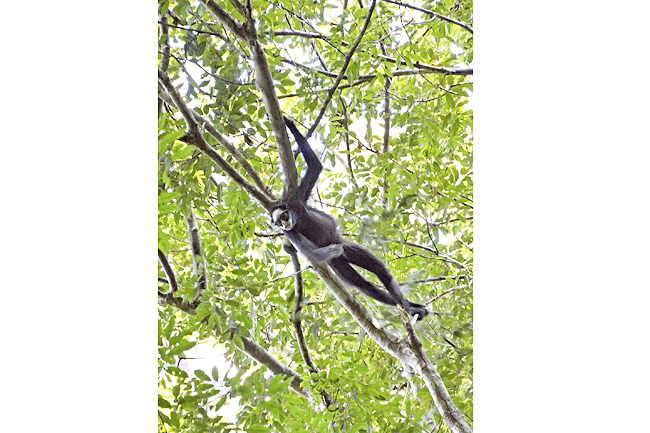RIO DE JANEIRO (AP) – After declaring the decision final, a state court backpedalled on Monday and re-opened a lawsuit that invalidates a protected area in Brazil’s Amazon. The judicial reversal is a setback for a cattle rancher dubbed the rainforest’s worst perpetrator.
The Mato Grosso state prosecutors’ office announced it was the re-opening, saying the state’s upper court failed to notify the office of its decision, as it is required in lawsuits that involve the public interest. The state’s upper court confirmed the reversal to The Associated Press.
The Cristalino II State Park stretches for 118,000 hectares, larger than New York City, and lies in the transition zone between the Amazon and drier Cerrado biomes. It is home to the endemic white-fronted spider monkey (Ateles marginatus), a species endangered due to habitat loss.
In a 3-2 decision, Mato Grosso´s upper court had ruled that the government’s creation of the park in 2001 was illegal because it took place without public consultation. The plaintiff is a company linked to Antonio José Rossi Junqueira Vilela, who has been fined millions of dollars for deforestation in Brazil and stealing thousands of hectares (acres) of the Amazon rainforest, including inside Cristalino II.

In 2016, the Vilela family made headlines in Brazil for being at the center of a landmark enforcement operation against deforestation in the Amazon. Brazil’s attorney general called him the single largest clearer of land in the Amazon.
The state government did not appeal, citing technical reasons, which led the court to declare the decision final in April.
Mato Grosso, Brazil’s largest soybean-producing state, is run by Governor Mauro Mendes, a pro-agri-business politician and ally of far-right President Jair Bolsonaro, who has repeatedly said Brazil has too many protected areas and vowed not to create more of them.
The legal events happened in recent months, but it was only last week that the local press broke news of the park’s dissolution, sparking the mobilisation of Brazil’s environmentalist organisations. Now with the lawsuit re-opened, the state prosecutor’s office plans to appeal to higher, national-level courts, In the meantime, the state government cannot reverse the park’s creation as it had announced it would do last week.
“The park continues,” said Edilene Amaral, a legal consultant with Mato Grosso Socio-environmental Observatory, a non-profit network, in a statement. “Any activity incompatible with full protection remains prohibited and subject to penalties.”



















































